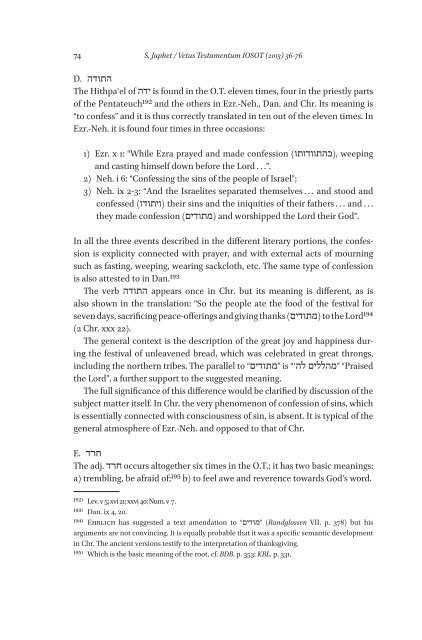Special Issue IOSOT 2013 - Books and Journals
Special Issue IOSOT 2013 - Books and Journals
Special Issue IOSOT 2013 - Books and Journals
You also want an ePaper? Increase the reach of your titles
YUMPU automatically turns print PDFs into web optimized ePapers that Google loves.
74 S. Japhet / Vetus Testamentum <strong>IOSOT</strong> (<strong>2013</strong>) 36-76<br />
התודה .D<br />
The Hithpaʿel of ידה is found in the O.T. eleven times, four in the priestly parts<br />
of the Pentateuch192 <strong>and</strong> the others in Ezr.-Neh., Dan. <strong>and</strong> Chr. Its meaning is<br />
“to confess” <strong>and</strong> it is thus correctly translated in ten out of the eleven times. In<br />
Ezr.-Neh. it is found four times in three occasions:<br />
1) Ezr. x 1: “While Ezra prayed <strong>and</strong> made confession ,(כהתוודותו) weeping<br />
<strong>and</strong> casting himself down before the Lord . . .”.<br />
2) Neh. i 6: “Confessing the sins of the people of Israel”;<br />
3) Neh. ix 2-3: “And the Israelites separated themselves . . . <strong>and</strong> stood <strong>and</strong><br />
confessed (ויתודו) their sins <strong>and</strong> the iniquities of their fathers . . . <strong>and</strong> . . .<br />
they made confession (מתודים) <strong>and</strong> worshipped the Lord their God”.<br />
In all the three events described in the different literary portions, the confession<br />
is explicity connected with prayer, <strong>and</strong> with external acts of mourning<br />
such as fasting, weeping, wearing sackcloth, etc. The same type of confession<br />
is also attested to in Dan.193<br />
The verb התודה appears once in Chr. but its meaning is different, as is<br />
also shown in the translation: “So the people ate the food of the festival for<br />
seven days, sacrificing peace-offerings <strong>and</strong> giving thanks (מתודים) to the Lord194<br />
(2 Chr. xxx 22).<br />
The general context is the description of the great joy <strong>and</strong> happiness during<br />
the festival of unleavened bread, which was celebrated in great throngs,<br />
including the northern tribes. The parallel to ”מתודים“ is לה׳“ ”מהללים “Praised<br />
the Lord”, a further support to the suggested meaning.<br />
The full significance of this difference would be clarified by discussion of the<br />
subject matter itself. In Chr. the very phenomenon of confession of sins, which<br />
is essentially connected with consciousness of sin, is absent. It is typical of the<br />
general atmosphere of Ezr.-Neh. <strong>and</strong> opposed to that of Chr.<br />
חרד .E<br />
The adj. חרד occurs altogether six times in the O.T.; it has two basic meanings:<br />
a) trembling, be afraid of;195 b) to feel awe <strong>and</strong> reverence towards God’s word.<br />
192) Lev. v 5; xvi 21; xxvi 40; Num. v 7.<br />
193) Dan. ix 4, 20.<br />
194) Ehrlich has suggested a text amendation to “מודים” (R<strong>and</strong>glossen VII, p. 378) but his<br />
arguments are not convincing. It is equally probable that it was a specific semantic development<br />
in Chr. The ancient versions testify to the interpretation of thanksgiving.<br />
195) Which is the basic meaning of the root, cf. BDB, p. 353; KBL, p. 331.








![Am HaSefer [Volk des Buches] - Books and Journals](https://img.yumpu.com/20648352/1/174x260/am-hasefer-volk-des-buches-books-and-journals.jpg?quality=85)







